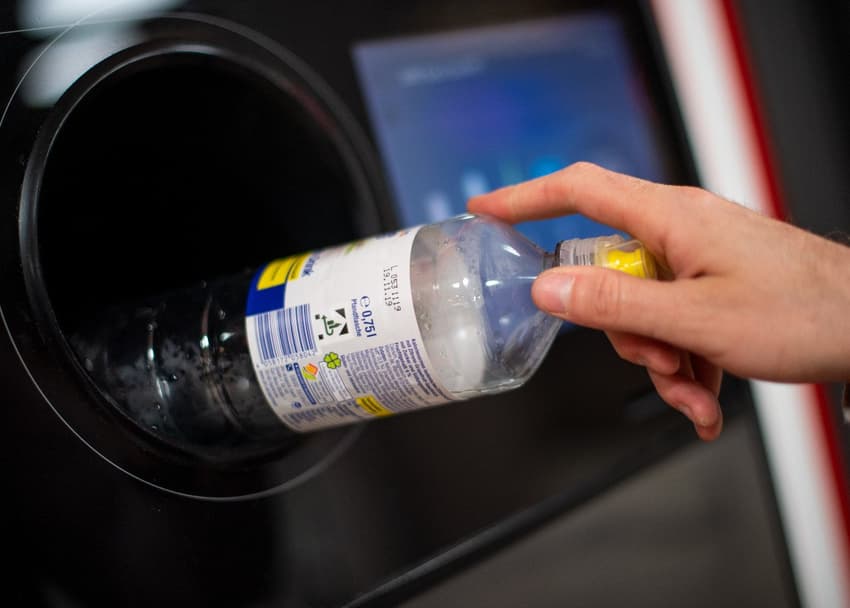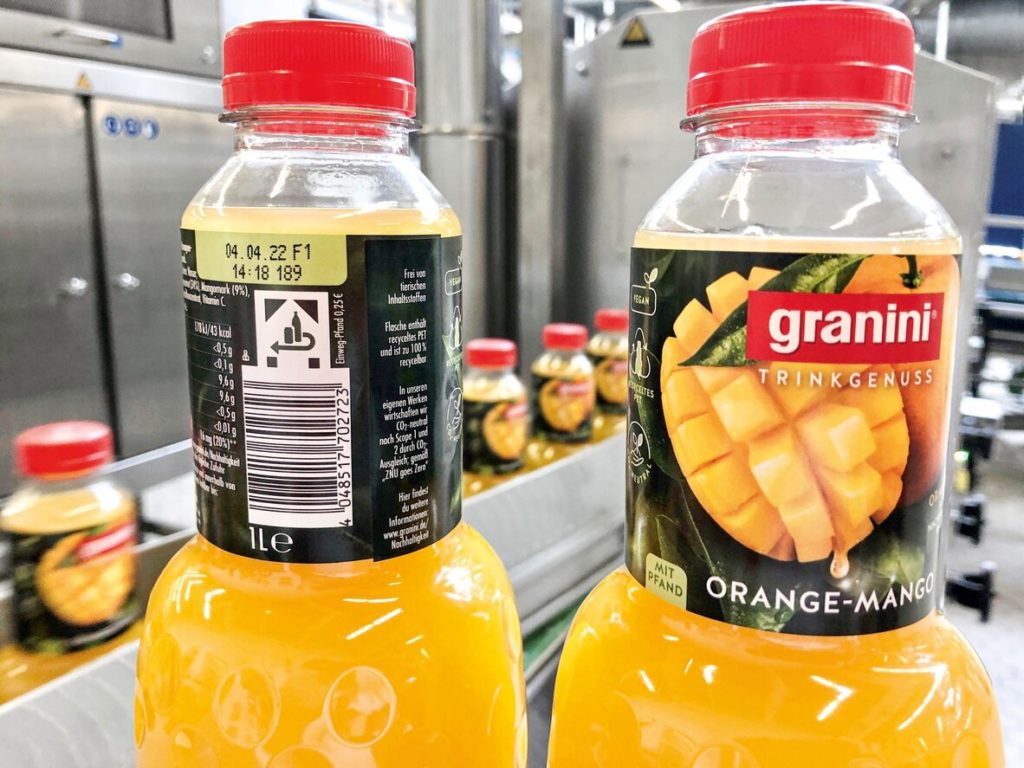Pfand: How Germany plans to expand its bottle deposit scheme in 2024

From next year, a Pfand - or deposit - will be introduced to more products under plans to extend the deposit scheme. Here's what we know so far.
What's happening?
Germany's Flaschenpfand (bottle deposit, known as Pfand), is a hugely popular recycling initiative in Germany, which involves consumers paying around 25 cents extra on bottles which they can then return and receive a refund. Some other products - such as glass bottles - have a smaller deposit, but the system works in the same way.
People often head to the supermarket with a bag - or even trolley - packed full of cans and bottles to recycle. They then receive a receipt which they can take to the cashier to get the money directly back, or off their next shopping bill.
It's been running for 20 years and is credited for keeping streets tidier and helping to boost recycling, something Germans take very seriously.
READ ALSO: German word of the day - Pfand
What's changing?
For several years, the deposit scheme only applied to mineral water, beer and soft drinks in cans and PET plastic bottles.
Since last year, however, a stricter regulation has been in effect. Customers now also have to pay a deposit on alcoholic mixed drinks, lemonades and fruit juices.
From next year, the deposit scheme will be extended even further.
In 2024, the new regulation will apply to almost all drinks from the refrigerated shelves. Customers will have to pay 25 cents more on milk, mixed milk beverages and drinkable milk products offered in one-way plastic beverage bottles.
If drinks are part of the scheme, they will carry the 'Pfand' logo. The aim is that supermarkets and discounters will stop selling drinks in non-returnable bottles or cans without a deposit.
"According to the German Packaging Act (VerpackG), these beverages become subject to the mandatory deposit and thus integrated into the DPG return and deposit system," said the German Deposit System (DPG) in a statement.
Which drinks will be subject to a new deposit from 2024?
Primarily, this concerns drinking milk products (for example Müller milk), fresh milk and iced coffee-style drinks such as Starbucks DoubleShot or Nescafé Ready-To-Drink. If manufacturers and retailers sell these products in plastic bottles, they will cost 25 cents more from January 1st.
For example, if fresh milk costs €1.79 in December, you'll have to pay €2.04 a month later. The 25 cents will then be refunded when the bottle is returned.

A juice bottle with the deposit label in 2021. Photo: picture alliance/dpa/Eckes-Granini Group GmbH | Eckes-Granini Group GmbH
However, it is still unclear how the deposit can be returned to people for these products. This is because there are often hygiene risks with dairy products. In addition to mould, unpleasant odours could also develop in the vending machines.
It is possible that customers will be asked to empty the packaging and rinse it with tap water before returning it. However, it is unclear whether all consumers would comply with this.
What's the reaction?
It's mixed. Currently plastic milk containers are meant to be placed in the yellow plastics bin and picked up by local authorities, meaning they are also recycled outside of the deposit system.
"Plastic milk bottles belong in the yellow bin and not in the return machines," Eckhard Heuser, Chief Executive of the Dairy Industry Association, has said, reported Focus Online.
The German Trade Association says that it is worried about leftover dairy residue affecting the recycling system if the items are mixed into the deposit machines.
Why is the government doing this?
The changes by the Federal Ministry for the Environment are part of a larger package of measures from the European Union to prevent waste. In Germany, all of the changes are to take effect in several stages by 2030.
As well as the deposit on all beverage bottles and cans, measures also include a quota for reusable and disposable products in supermarkets.
"The one-way deposit system, which is implemented nationwide by DPG Deutsche Pfandsystem GmbH and its network of system participants and partners, is thus once again contributing to the Europe-wide objective of reusing valuable raw materials," said the DPG.
Comments
See Also
What's happening?
Germany's Flaschenpfand (bottle deposit, known as Pfand), is a hugely popular recycling initiative in Germany, which involves consumers paying around 25 cents extra on bottles which they can then return and receive a refund. Some other products - such as glass bottles - have a smaller deposit, but the system works in the same way.
People often head to the supermarket with a bag - or even trolley - packed full of cans and bottles to recycle. They then receive a receipt which they can take to the cashier to get the money directly back, or off their next shopping bill.
It's been running for 20 years and is credited for keeping streets tidier and helping to boost recycling, something Germans take very seriously.
READ ALSO: German word of the day - Pfand
What's changing?
For several years, the deposit scheme only applied to mineral water, beer and soft drinks in cans and PET plastic bottles.
Since last year, however, a stricter regulation has been in effect. Customers now also have to pay a deposit on alcoholic mixed drinks, lemonades and fruit juices.
From next year, the deposit scheme will be extended even further.
In 2024, the new regulation will apply to almost all drinks from the refrigerated shelves. Customers will have to pay 25 cents more on milk, mixed milk beverages and drinkable milk products offered in one-way plastic beverage bottles.
If drinks are part of the scheme, they will carry the 'Pfand' logo. The aim is that supermarkets and discounters will stop selling drinks in non-returnable bottles or cans without a deposit.
"According to the German Packaging Act (VerpackG), these beverages become subject to the mandatory deposit and thus integrated into the DPG return and deposit system," said the German Deposit System (DPG) in a statement.
Which drinks will be subject to a new deposit from 2024?
Primarily, this concerns drinking milk products (for example Müller milk), fresh milk and iced coffee-style drinks such as Starbucks DoubleShot or Nescafé Ready-To-Drink. If manufacturers and retailers sell these products in plastic bottles, they will cost 25 cents more from January 1st.
For example, if fresh milk costs €1.79 in December, you'll have to pay €2.04 a month later. The 25 cents will then be refunded when the bottle is returned.

However, it is still unclear how the deposit can be returned to people for these products. This is because there are often hygiene risks with dairy products. In addition to mould, unpleasant odours could also develop in the vending machines.
It is possible that customers will be asked to empty the packaging and rinse it with tap water before returning it. However, it is unclear whether all consumers would comply with this.
What's the reaction?
It's mixed. Currently plastic milk containers are meant to be placed in the yellow plastics bin and picked up by local authorities, meaning they are also recycled outside of the deposit system.
"Plastic milk bottles belong in the yellow bin and not in the return machines," Eckhard Heuser, Chief Executive of the Dairy Industry Association, has said, reported Focus Online.
The German Trade Association says that it is worried about leftover dairy residue affecting the recycling system if the items are mixed into the deposit machines.
Why is the government doing this?
The changes by the Federal Ministry for the Environment are part of a larger package of measures from the European Union to prevent waste. In Germany, all of the changes are to take effect in several stages by 2030.
As well as the deposit on all beverage bottles and cans, measures also include a quota for reusable and disposable products in supermarkets.
"The one-way deposit system, which is implemented nationwide by DPG Deutsche Pfandsystem GmbH and its network of system participants and partners, is thus once again contributing to the Europe-wide objective of reusing valuable raw materials," said the DPG.
Join the conversation in our comments section below. Share your own views and experience and if you have a question or suggestion for our journalists then email us at [email protected].
Please keep comments civil, constructive and on topic – and make sure to read our terms of use before getting involved.
Please log in here to leave a comment.